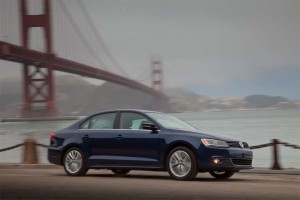New numbers from Volkswagen indicate the German automaker is moving closer to displacing Toyota as the world’s top automaker.
The Volkswagen Group reported from its headquarters in Wolfsburg that it sold more than 4 million vehicles between January and July, representing a 13.7% increase. As a result, Europe’s largest automaker continued to out-perform the overall market, inching closer to the top spot.
In the last direct comparison between VW and Toyota at the end of June, the Japanese auto giant had the lead having sold 3.862 million vehicles to VW’s 3.598 million. However, VW, which has never kept secret its desire to replace Toyota as the world’s largest automaker, has plenty of momentum, including record sales in China.
Meanwhile, Toyota is struggling, especially in Europe, where sales have been declining outright, while it has also lost market share in the U.S., which is its largest single market in the world now.
While generally optimistic, VW officials have expressed some caution about the second half of the year.
“After a very successful first six months we got off to a good start in the second half of the year,” said Group Board Member for Sales Christian Klingler. But maintaining the January-June pace, he added, “will be a challenge, given an operating environment that is again becoming difficult. Now that incentive programs have come to an end, the global automotive market is expected to decline in the second half of the year. There will not be a return to the high pre-crisis (sales) levels this year.”
Nevertheless the Volkswagen Group continues to perform well in almost all major markets. In China deliveries in the first seven months grew 42.2% to 1.11 million – while the numbers in the booming Indian market rocketed ahead a full 121%. For the entire Asia/Pacific region Volkswagen reported a growth rate of 42.3% with deliveries totaling 1.23 million vehicles.
In Europe the Group delivered a total of 2.0 million vehicles to customers. That rise of 2.2% was all the more significant considering the overall market contracted by 1.8%. In Western Europe, excluding the subdued German market, Volkswagen reported growth of 18.4% million vehicles.
VW’s clear goal of gaining the global top spot stands in sharp contrast to Toyota’s positioning. Though industry insiders suggested the Japanese maker had long coveted being number one, senior company officials, including current CEO Akio Toyoda, regularly insisted they were focused on other goals.
The Japanese giant toppled long-time king-of-the-hill General Motors in 2008, just before the U.S. company plunged into bankruptcy. But Toyota’s global victory was quickly followed by a series of setbacks, most notably including a safety scandal that has tarnished its image and forced it to recall millions of vehicles around the globe.
During the first months of the year, its U.S. sales and share collapsed, though Toyota officials started to stabilize the situation with some of the biggest incentives in the company’s history. But sales have not rebounded nearly as well as the competition and that could be enough to cost Toyota the global sales crown.
Then again, VW has its own challenges. The maker is just launching the latest-generation Jetta, an important part of its growth strategy, especially in the U.S., where it has long struggled. A new American plant is getting ready to open, and will build a new midsize sedan that will determine whether Volkswagen can meet its stretch goal of boosting sales to 800,000 annually. Falling short would be a critical setback — and one that could see the battle for global leadership go back and forth for some years to come.
Paul A. Eisenstein contributed to this report.

